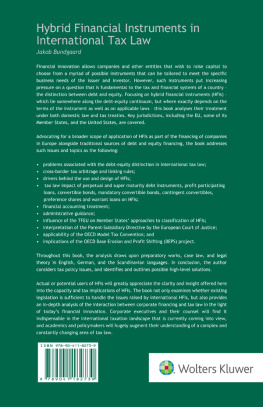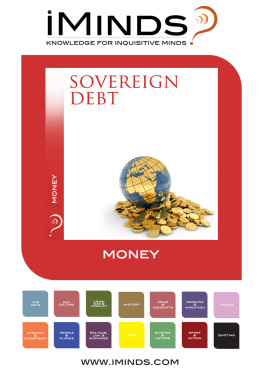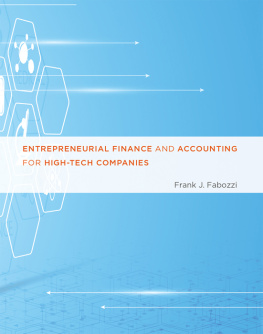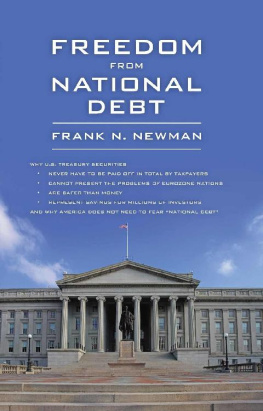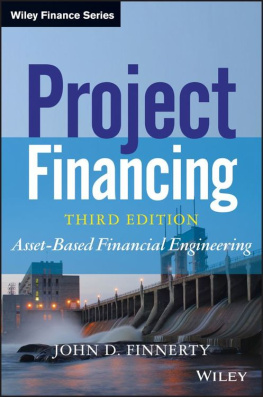Hybrid Financial Instruments in International Tax Law
Published by:
Kluwer Law International B.V.
PO Box 316
2400 AH Alphen aan den Rijn
The Netherlands
Website: www.wklawbusiness.com
Sold and distributed in North, Central and South America by:
Wolters Kluwer Legal & Regulatory U.S.
7201 McKinney Circle
Frederick, MD 21704
United States of America
Email:
Sold and distributed in all other countries by:
Turpin Distribution Services Ltd
Stratton Business Park
Pegasus Drive, Biggleswade
Bedfordshire SG18 8TQ
United Kingdom
Email:
Printed on acid-free paper.
ISBN 978-90-411-8273-9
e-Book: ISBN 978-90-411-8318-7
web-PDF: ISBN 978-90-411-8319-4
2017 Kluwer Law International BV, The Netherlands
All rights reserved. No part of this publication may be reproduced, stored in a retrieval system, or transmitted in any form or by any means, electronic, mechanical, photocopying, recording, or otherwise, without written permission from the publisher.
Permission to use this content must be obtained from the copyright owner. Please apply to: Permissions Department, Wolters Kluwer Legal & Regulatory U.S., 76 Ninth Avenue, 7th Floor, New York, NY 10011-5201, USA. Website: www.wklawbusiness.com
Printed in the United Kingdom.
Table of Contents
PART I
Setting the Scene
CHAPTER 1
Introduction
CHAPTER 2
Non-tax Framework and Drivers
CHAPTER 3
Basic Principles Determining the Taxation of Debt, Equity and Hybrid Financial Instruments
PART II
General Tax Framework Applicable to the Classification of Hybrid Financial Instruments
CHAPTER 4
Domestic Criteria Applied to the Classification of Hybrid Financial Instruments
CHAPTER 5
Classification of Hybrid Financial Instruments According to Tax Treaties
CHAPTER 6
General Principles for the Classification and Taxation of Hybrid Financial Instruments Derived from European Union Law
CHAPTER 7
Cross-Border Tax Arbitrage and Hybrid Financial Instruments
PART III
Classification and Treatment of Specific Hybrid Financial Instruments
CHAPTER 8
General Considerations
CHAPTER 9
Equity-Flavored Debt Instruments
CHAPTER 10
Debt-Flavored Equity Instruments
PART IV
Conclusions and Tax Policy Recommendations
CHAPTER 11
Conclusions
CHAPTER 12
Tax Policy Considerations
Preface
This study concerns hybrid financial instruments with an emphasis on international tax law issues arising in the context of issuance of and investment in such innovative financial instruments (IFIs) from a practical as well as a theoretical perspective.
The study has taken quite some time since the launch in early 2007, where I had the privilege of being a visiting scholar at Stanford Law School. Since then, I have not been able to allocate my full attention to the study due to other less academic duties, which explain the longevity of the writing process. Consequently, I have published some of the interim results along the way as articles in tax law periodicals.
Throughout the duration of the study, I have obtained generous and kind support for the project. The Deloitte Foundation and Deloitte, Copenhagen (my previous employer) have been enormously generous in their financial support to the project. This allowed me to spend some dedicated time to conduct the research, while having the privilege of working with the issues at hand in practice and also benefitting from the valuable knowledge and experience of skilled colleagues from all over the world. The study has moreover received financial support from the Nordic Tax Research Council (in 2007 and 2012), from Studiefonden of FSR (The Study Foundation of the Danish Association of State Authorized Public Accountants) and the Nasdaq OMX Foundation. I would like to express my sincere gratitude to all the sponsors for the valuable and much appreciated support.
I would also like to express my gratitude to Professor Jeff Strnad (Charles A. Beardsley Professor of Law at Stanford Law School) for sponsoring me, and consequently allowing me the opportunity to be a visiting scholar at Stanford Law School.
Gratitude is also extended to professor emeritus Aage Michelsen, University of Aarhus, for the curtsey of providing me with his valuable input regarding the early draft plan for the study.
I would like to send a word of gratitude to the invaluable colleagues at CORIT Advisory (in particular Katja Dyppel Weber, Peter Koerver Schmidt and Michael Tell), with whom I have been so fortunate to be able to discuss tax law issues for several years. Last but not least let me express my gratitude and love to my family (Cathrine, Elias, Cecilie and Filippa), who have travelled with me on longer research stays during the study.
All errors and misunderstandings remain my sole responsibility.
Jakob Bundgaard
Kongens Lyngby, May 2016
This book is # 6 in the CORIT Academic Books Series
List of Abbreviations
AAR | Authority for Advance Rulings |
ABL | Aktieavancebeskatningsloven / Danish Act on Taxation of Capital Gains on Sale of Shares |
ACC | Allowance for Corporate Capital |
ACE | Allowance for Corporate Equity / Allowance for the Cost of Equity |
AHYDO | Applicable High Yield Discount Obligation |
ARCN | Adjusted Rate Convertible Note |
ARPS | Adjustable Rate Preferred Stocks |
ATA-Directive | Anti Tax Avoidance Directive |
BCBS | Banking Committee on Banking Supervision |
BEPS | Base Erosion and Profit Shifting |
BFH | Bundesfinanzhof |
BIT | Bulletin for International Taxation |
BStBl | Bundessteuerblatt |
CBIT | Comprehensive Business Income Tax |
CCCTB | Common Consolidated Corporate Tax Base |
CCD | Compulsory Convertible Bond |
CEN | Capital Export Neutrality |
CFC | Controlled Foreign Company / Controlled Financial Company |
CIN | Capital Import Neutrality |
COCA | Cost of Capital Allowance |
CoCo | Contingent Convertible |
CPEC | Convertable Preferred Equity Certificate |
CRD4 | Capital Requirement Directive |
CTA | Corporate Tax Act |
D/NI | Deduction / No inclusion |
DARPS | Dutch Auction Rate Preferred Stock |
DD | Double Deduction |
DECS | Dividend Enhanced Convertible Stock / Debt Exchangeable for Common Stock |
DFI | Derivatives and Financial Instruments |
DKK | Danish Kroner |
EBIT | Earnings Before Interests and Tax |
EBITDA | Earnings Before Interests, Taxes, Depreciations and Amortization |
ECAPS | Enhanced Capital Advantaged Preferred Securities |
ECJ | European Court of Justice |
ECTR | EC Tax review |

